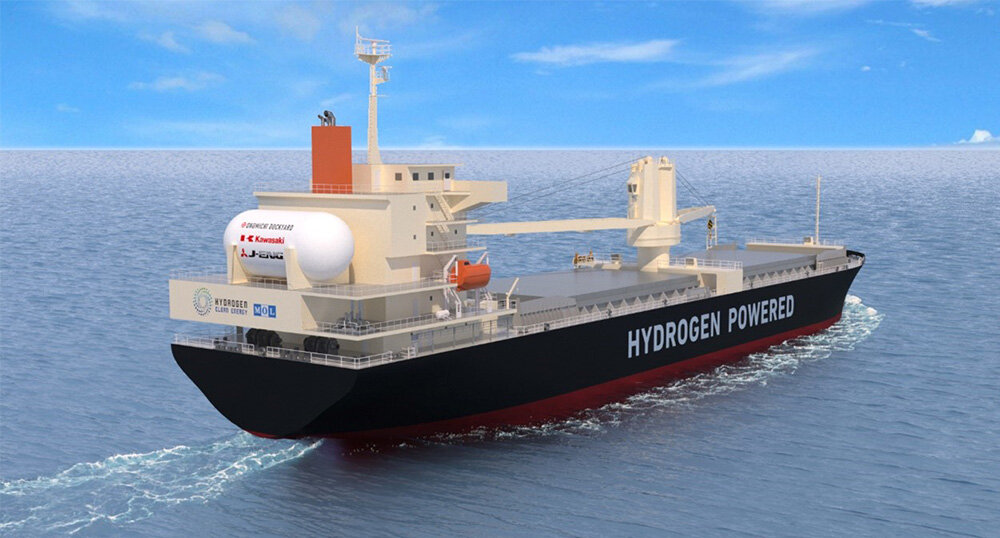ClassNK has granted Approval in Principle (AiP) to a Multi-Purpose Vessel concept powered by hydrogen, with Mitsui O.S.K Lines (MOL), Onomichi Dockyard, Kawasaki Heavy Industries, and Japan Engine Corporation conducting the risk assessment. MOL stated this marks the first AiP certification for a ship equipped with a low-speed two-stroke hydrogen-fueled engine as the main propulsion engine, and a two-year demonstration operation is planned from around FY2027.
Toyota plans to use converted fuel cell coaches to transport over 5,000 visitors during the Olympic and Paralympic Games Paris 2024 as part of its guest program. After the Games, these hydrogen coaches will continue their service cycle, benefiting public and private customers in the Ile de France region as a Paris 2024 legacy. Toyota will supply hydrogen fuel cell modules for the conversion of ten used Iveco coaches.
Mabanaft has signed an agreement with Fairplay Towage Group, a tugboat operator, to supply hydrogen to their new tugs in the Port of Hamburg starting in 2025, supporting the maritime industry's shift toward sustainable technologies.
H2 Mobility Deutschland has inaugurated hydrogen charging stations in Dresden and Berg, near Hof, using hydrogen from Rießner Gase produced through PEM electrolysis powered by solar and wind energy. The hydrogen production plant in the Wunsiedel energy park, in collaboration with the Wunsiedel municipal company and Siemens, is Bavaria's largest, currently producing 960 tons of hydrogen per year, with plans for a second expansion phase to increase the electrolyzer's capacity to 17.5 MW.
Protium and its partners have secured over GBP 30 million ($36.5 million) from the Department for Transport and Innovate UK to initiate the Hydrogen Aggregated UK Logistics (HyHAUL) project, which focuses on accelerating hydrogen adoption in the mobility sector, particularly in heavy goods vehicle (HGV) fleets. By 2026, HyHAUL plans to introduce 30 hydrogen fuel cell HGVs to haulage operators, with a further goal of deploying 300 vehicles by 2030.
Wood Mackenzie says that the US Department of Energy's (DOE) $7 billion investment across seven Regional Clean Hydrogen Hubs (H2Hubs) marks a significant step toward establishing a low-carbon hydrogen economy but is just the initial stage. The hubs' combined production would only contribute 30% to the 10 Mtpa hydrogen supply capacity goal if fully developed, and not all hubs are expected to reach full development by 2030. Each hub has received an initial $20 million for developing detailed project plans over the next 12 to 18 months, with the allocated funding to be disbursed in stages over the next 8 to 12 years.
The Atlantic Council says that the DOE's announcement represents the most substantial public investment in US hydrogen and noted that California and Texas are the hubs of clean hydrogen activities, with a future outlook for blue hydrogen. However, the council mentioned a missed opportunity for hydrogen use in long-haul trucking. To address this, the Atlantic Council made recommendations for policymakers, suggesting a focus on cost sharing for demand-side projects within the H2Hub funding derived from the Bipartisan Infrastructure Law.
Air Liquide has become a partner for six of the seven Hubs supported by the US government, strengthening its commitment to building a robust hydrogen network in the industry. The French industrial gases company aims to scale up its hydrogen initiatives with these partnerships, supporting the expansion of hydrogen infrastructure. Air Liquide has participated as a partner or supporter in these endeavors.
This content is protected by copyright and may not be reused. If you want to cooperate with us and would like to reuse some of our content, please contact: editors@pv-magazine.com.



1 comment
By submitting this form you agree to pv magazine using your data for the purposes of publishing your comment.
Your personal data will only be disclosed or otherwise transmitted to third parties for the purposes of spam filtering or if this is necessary for technical maintenance of the website. Any other transfer to third parties will not take place unless this is justified on the basis of applicable data protection regulations or if pv magazine is legally obliged to do so.
You may revoke this consent at any time with effect for the future, in which case your personal data will be deleted immediately. Otherwise, your data will be deleted if pv magazine has processed your request or the purpose of data storage is fulfilled.
Further information on data privacy can be found in our Data Protection Policy.